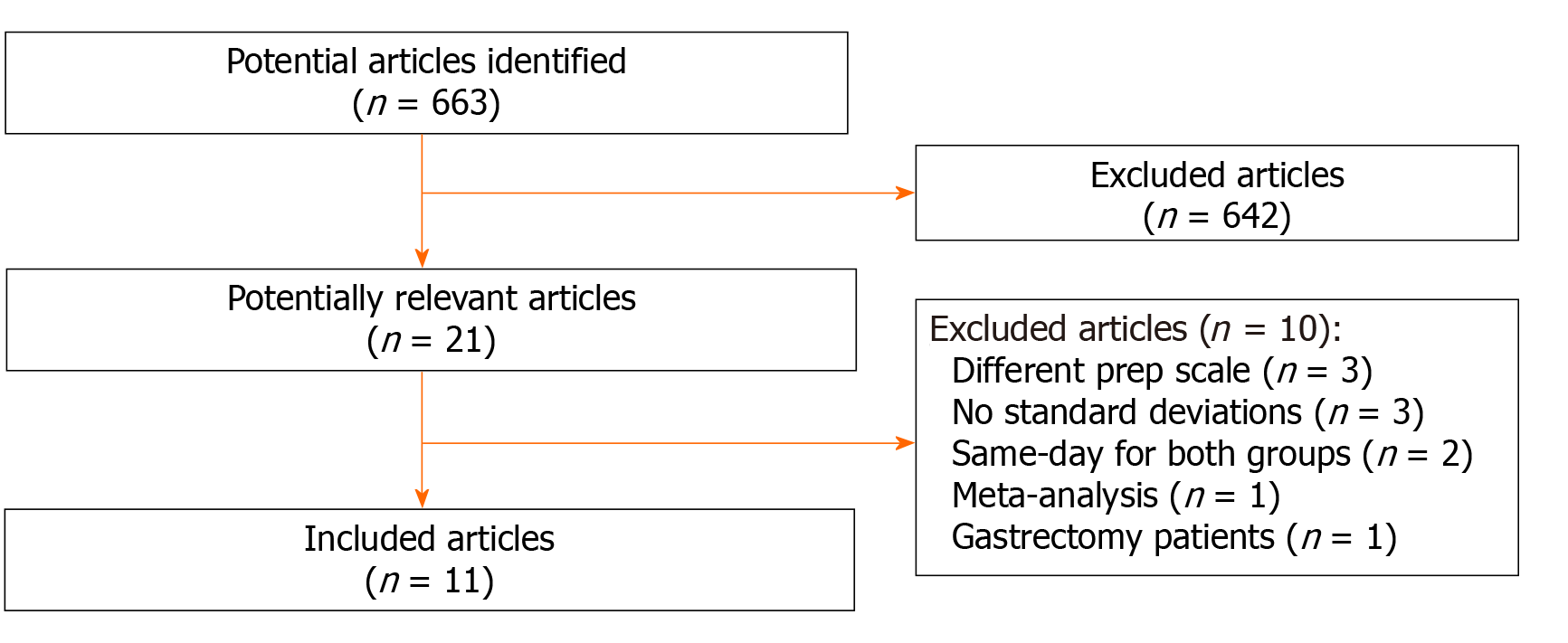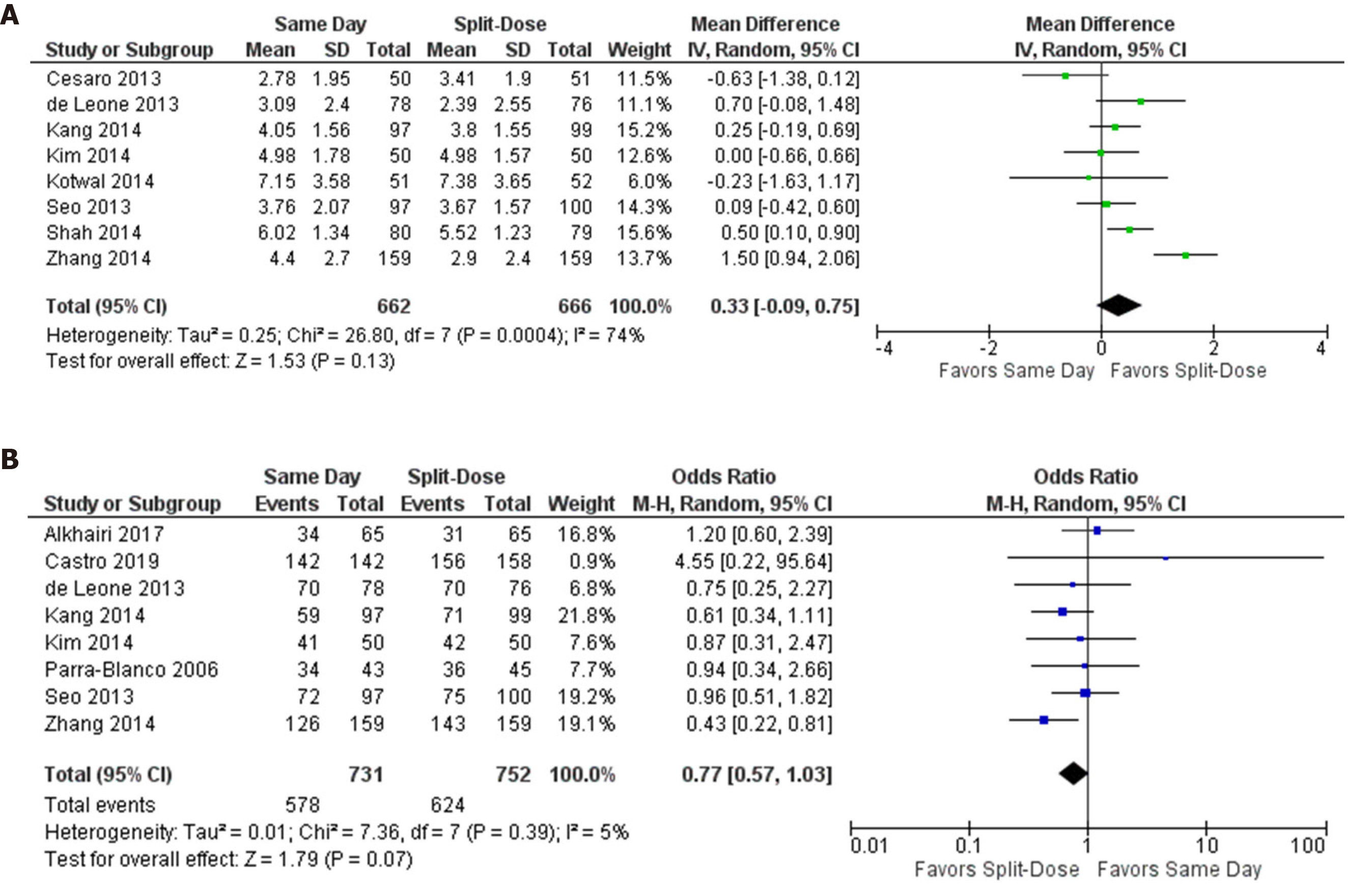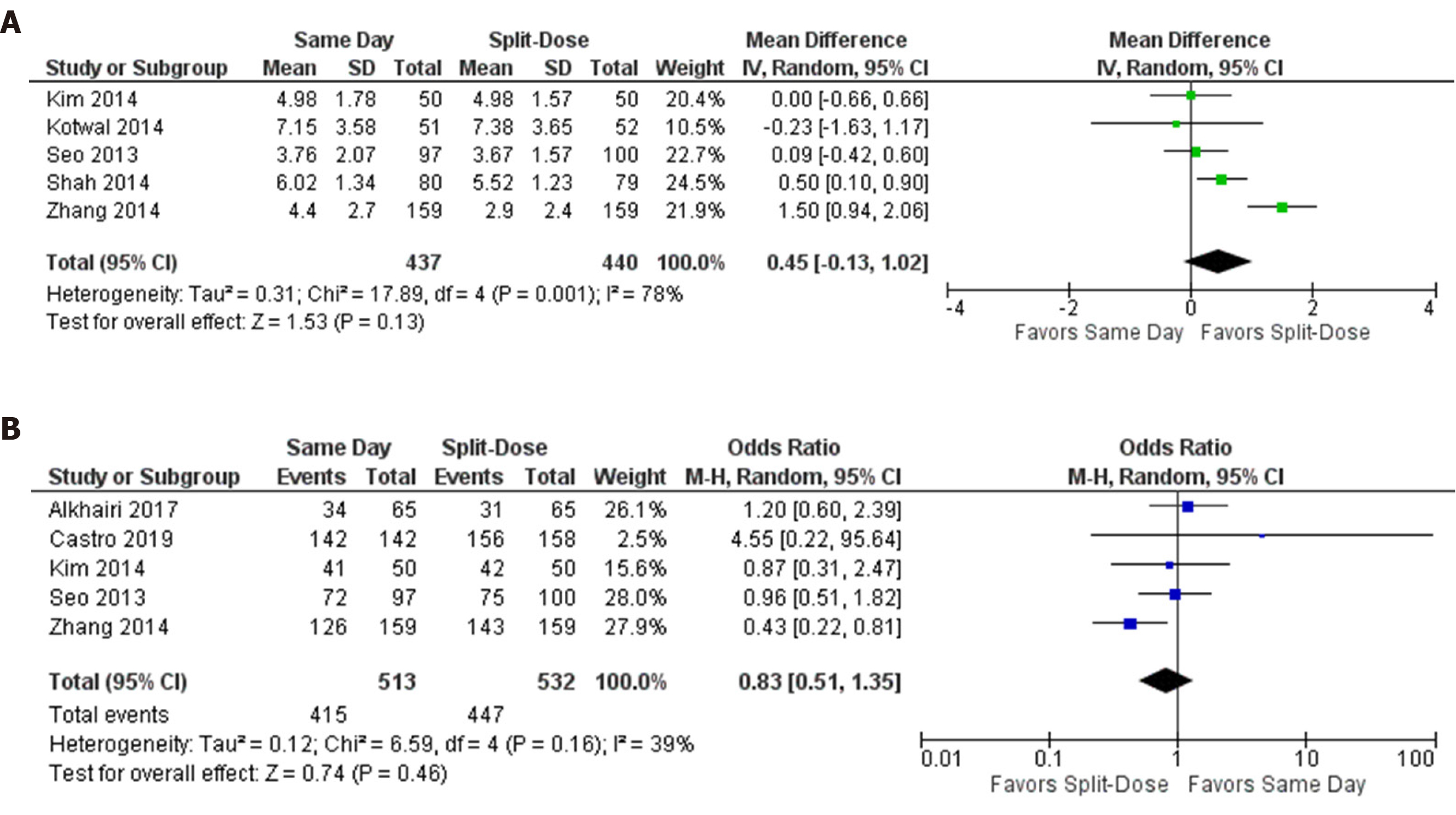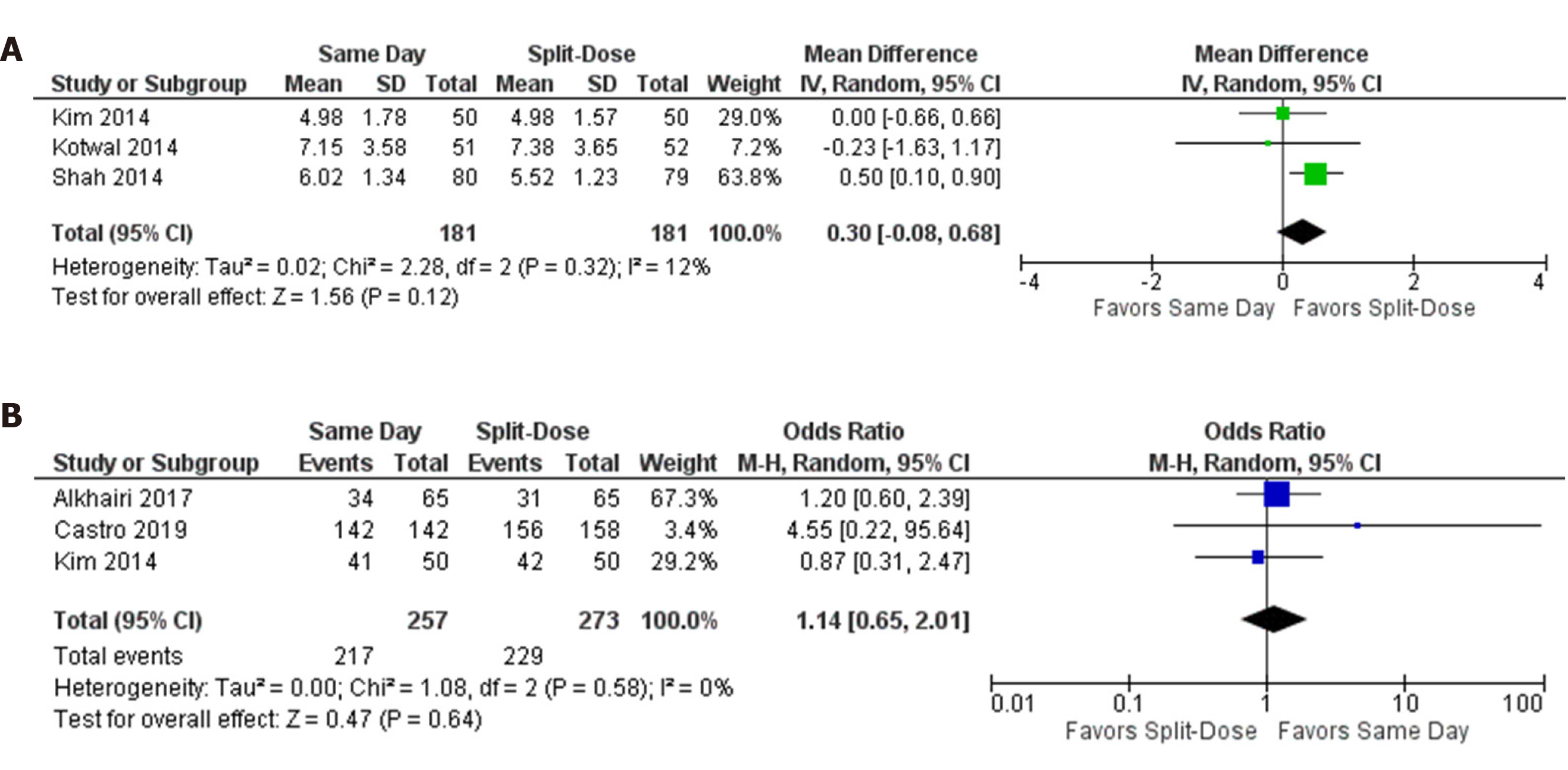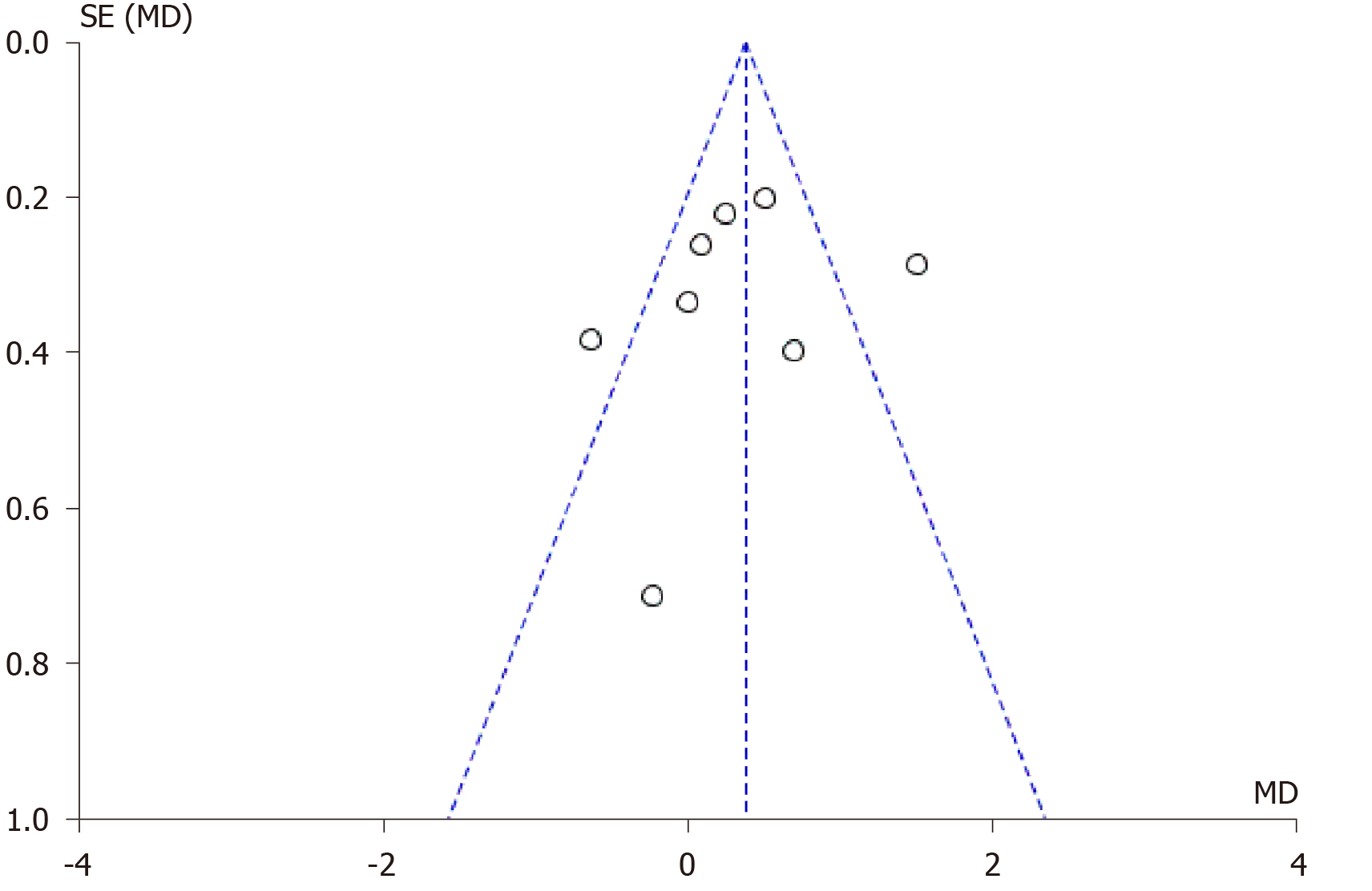Published online Dec 28, 2020. doi: 10.13105/wjma.v8.i6.462
Peer-review started: July 15, 2020
First decision: November 2, 2020
Revised: November 11, 2020
Accepted: November 21, 2020
Article in press: November 21, 2020
Published online: December 28, 2020
Processing time: 166 Days and 4.5 Hours
Quality of bowel preparation in afternoon colonoscopies has been a struggle. Currently, a choice of same-day preparation (SaD) or split-dose preparation (SpD) exists; however, randomized controlled trials’ results have varied.
To examine the outcomes of SaD and SpD for afternoon colonoscopies.
An extensive literature search was conducted using multiple databases. Only randomized controlled trials (RCTs) in adults that compared SaD to SpD with Ottawa bowel preparation score (OBPS) were included. Odds ratio (OR) or mean difference was used to analyze outcomes.
Eleven RCTs were included (n = 1846). No difference was observed for satisfactory bowel preparation based on OBPS among participants receiving SaD vs SpD (OR 0.77; 95%CI: -0.57-1.03; P = 0.07; I2 = 5%). Subgroup analysis showed no difference in terms of satisfactory bowel preparation based on OBPS between the two groups when receiving same preparation formula (polyethylene glycol) (OR 0.83; 95%CI: 0.51-1.35; P = 0.46; I2 = 39%) as well as receiving same formula and volume (4 L polyethylene glycol) (OR 1.14; 95%CI: 0.65-2.01; P = 0.64; I2 = 0%).
In patients undergoing afternoon colonoscopies, SaD is comparable with SpD in terms of satisfactory bowel preparation. Further studies are needed to validate these results and determine the optimal formula and dosages.
Core Tip: Afternoon colonoscopies have considerably more inadequate bowel preparations than morning colonoscopies. Different bowel preparation regimens have been tried to help improve preparation quality in afternoon colonoscopies, including split-dose and same-day bowel preparations. Studies have shown conflicting results on which preparation regimen is optimal. Therefore, we conducted a meta-analysis on this subject and found that split-dose bowel preparation shows no difference in satisfactory bowel preparations vs same-day bowel preparation for afternoon colonoscopies. Therefore, either preparation may be utilized.
- Citation: Parsa N, Grisham EA, Cockerell CJ, Matteson-Kome ML, Bysani RV, Samiullah S, Nguyen DL, Tahan V, Ghouri YA, Puli SR, Bechtold ML. Split-dose vs same-day bowel preparation for afternoon colonoscopies: A meta-analysis of randomized controlled trials. World J Meta-Anal 2020; 8(6): 462-471
- URL: https://www.wjgnet.com/2308-3840/full/v8/i6/462.htm
- DOI: https://dx.doi.org/10.13105/wjma.v8.i6.462
Colorectal cancer (CRC) is a common and devastating disease resulting in significant cancer deaths around the world[1,2]. Colonoscopy remains the screening test of choice for CRC and the only method which encompasses both diagnostic and therapeutic potential[3]. Afternoon colonoscopies have higher rates of suboptimal bowel preparation[4]. Suboptimal bowel preparations are associated with prolonged procedure time, low adenoma detection rate, and increased patient discomfort, complications, and healthcare costs[5-7].
Several studies have suggested that the quality of bowel cleansing for afternoon colonoscopies depends on timing and quantity of the bowel preparation[8,9]. Some studies have shown that split-dosing bowel preparations (SpD) is superior to same-day preparation (SaD, the morning of the procedure) with regard to both cleansing efficacy and tolerability, while other studies report that SaD has a better cleansing and tolerability compared with SpD. Currently, the U.S. Multi-Society Task Force on Colorectal Cancer (USMSTF) recommends SaD regimen as an alternative for SpD for colonoscopies in the afternoon[10] This recommendation was made based on the results of one prospective study comparing the SaD regimen with the SpD regimen and two randomized controlled trials (RCTs) using controls with day-prior regimens[6,11,12].
Recently published RCTs on this topic report mixed results. Moreover, data pooling from the RCTs is challenging given varied bowel preparation regimens and bowel preparation scales. Therefore, a meta-analysis of the RCTs to compare the SaD with the SpD regimens for afternoon colonoscopies was performed.
Literature search was conducted with a three-fold system. First, multiple databases, including EMBASE, Cochrane databases, MEDLINE/PubMed, Google Scholar, CINAHL, and Scopus were searched in November 2019 for afternoon and colonoscopy. Second, major conference proceeding abstracts (Digestive Disease Week, American College of Gastroenterology, United European Gastroenterology meetings) were searched through November 2019. Third, references from identified studies were searched for any potentially omissions. If data required clarification, we communicated with the authors.
All RCTs on adults comparing the SaD with SpD regimen for afternoon colonoscopies, using the Ottawa bowel preparation score (OBPS) were included. Exclusion criteria were patients < 18 years old or non-RCTs. To reduce confounding, subgroup analyses were performed for the same formulation and volume of bowel preparation using polyethylene glycol with electrolytes (PEG). Two authors (Parsa NP and Grisham EA) independently reviewed all the studies for inclusion and extracted data using standard forms. Any disagreements on inclusion or data extraction were settled by the senior author (Bechtold ML).
The Cochrane’s Collaboration Risk of Bias Tool was used to assess the quality of studies[13-15]. For each study, a grade, as described as low, moderate, or high, was based on the assessment of limitations, effect magnitude, precision, publication and other forms of bias, and consistency of results[13-15].
A meta-analysis was conducted comparing SaD and SpD for afternoon colonoscopies by calculating pooled estimates of quality of bowel preparation. Outcomes were analyzed using mean difference (MD) or odds ratio (OR) by the DerSimonian and Laird method (the random-effects model). The I2 measure of inconsistency was used to assess heterogeneity (P < 0.10 or I2 > 50% was deemed significant). If heterogeneity was discovered, researchers used performed a sensitivity analysis to remove the least amount of studies necessary to reach non-significant heterogeneity by comparing results to the original pooled data. RevMan 5.3 (Review Manager, Version 5.3, Copenhagen: The Nordic Cochrane Centre, The Cochrane Collaboration, 2012) was used for statistical analysis. Funnel plots assessed for publication bias.
Evaluation of titles and abstracts resulted in 663 articles being identified. After review, 21 articles remaining in which 11 satisfied the inclusion criteria (n = 1846) with mean age range of 51.6-61.8 years[16-26] (Figure 1). Studies were global, including many countries (United States, Spain, Italy, China, Korea, India) (Table 1). Most of the studies were deemed high-quality studies based on quality assessment (Table 2).
| Ref. | Country | Number of patients (n) | Bowel preparation times (dose 1) | Patients per group (n) | Bowel preparation scale | Satisfactory bowel preparations (n) | OBPS (mean score ± SD) |
| Parra-Blanco et al[16], 2006 | Spain | 88 | Same day PEG 3 L | 43 | Ottawa | 34 | ND |
| Split-dose NaP 45 mL/45 mL | 45 | Ottawa | 36 | ND | |||
| Kang et al[24], 2014 | South Korea | 196 | Same day NaP 1/1 | 97 | Ottawa | 59 | 4.05 ± 1.56 |
| Split-dose PEG 2 L/2 L | 99 | Ottawa | 71 | 3.8 ± 1.55 | |||
| Shah et al[17], 2014 | India | 159 | Same day PEG 2 L | 80 | Ottawa | ND | 6.02 ± 1.34 |
| Split-dose PEG 1 L/1 L | 79 | Ottawa | ND | 5.52 ± 1.23 | |||
| Cesaro et al[18], 2013 | Italy | 101 | Same day Halflytely 2 L/10-20 mg Bisacodyl | 50 | Ottawa | ND | 2.78 ± 1.95 |
| Split-dose PEG 3 L/1 L | 51 | Ottawa | ND | 3.41 ± 1.90 | |||
| de Leone et al[19], 2013 | Italy | 154 | Same day Halflytely 2 L/10-20 mg Bisacodyl | 78 | Ottawa | 70 | 3.09 ± 2.4 |
| Split-dose PEG 2 L/2 L | 76 | Ottawa | 70 | 2.39 ± 2.55 | |||
| Kim et al[25], 2014 | South Korea | 100 | Same day PEG 4 L | 50 | Ottawa | 41 | 4.98 ± 1.78 |
| Split-dose PEG 2 L/2 L | 50 | Ottawa | 42 | 4.98 ± 1.57 | |||
| Kotwal et al[20], 2014 | United States | 103 | Same day PEG 3 L | 51 | Ottawa | ND | 7.15 ± 3.58 |
| Split-dose PEG 2 L/2 L | 52 | Ottawa | ND | 7.38 ± 3.65 | |||
| Seo et al[21], 2013 | South Korea | 197 | Same day PEG 2 L | 97 | Ottawa | 72 | 3.76 ± 2.07 |
| Split-dose PEG 2 L/2 L | 100 | Ottawa | 75 | 3.67 ± 1.57 | |||
| Zhang et al[23], 2014 | China | 318 | Same day PEG 2 L | 159 | Ottawa | 126 | 4.4 ± 2.7 |
| Split-dose PEG 1 L/2 L | 159 | Ottawa | 143 | 2.9 ± 2.4 | |||
| Alkhairi et al[26], 2017 | United States | 300 | Same day PEG 4 L | 142 | Ottawa | 142 | ND |
| Split-dose PEG 2 L/2 L | 158 | Ottawa | 156 | ND | |||
| Castro et al[22], 2019 | United States | 130 | Same day PEG 4 L | 65 | Ottawa | 34 | ND |
| Split-dose PEG 2 L/2 L | 65 | Ottawa | 31 | ND |
| Ref. | Study design | Random sequence generation | Allocation concealment | Blinding | Blinding outcome assessment | Incomplete outcome data | Selective reporting | Other bias | Quality assessment |
| Parra-Blanco et al[16], 2006 | RCT | Adequate | Adequate | Single-blinded | Adequate | None | None | None | High |
| Kang et al[24], 2014 | RCT | Adequate | Adequate | Single-blinded | Adequate | None | None | None | High |
| Shah et al[17], 2014 | RCT | Adequate | Adequate | Single-blinded | Adequate | None | None | None | High |
| Cesaro et al[18], 2013 | RCT | Adequate | Adequate | Single-blinded | Adequate | None | None | None | High |
| de Leone et al[19], 2013 | RCT | Adequate | Adequate | Single-blinded | Adequate | None | None | None | High |
| Kim et al[25], 2014 | RCT | Not described | Adequate | Single-blinded | Adequate | None | None | None | Moderate |
| Kotwal et al[20], 2014 | RCT | Adequate | Adequate | Single-blinded | Adequate | None | None | None | High |
| Seo et al[21], 2013 | RCT | Adequate | Adequate | Single-blinded | Adequate | None | None | None | High |
| Zhang et al[23], 2014 | RCT | Adequate | Adequate | Single-blinded | Adequate | None | None | None | High |
| Castro et al[22], 2019 | RCT | Adequate | Adequate | Single-blinded | Adequate | None | None | None | High |
| Alkhairi et al[26], 2017 | RCT | Not described | Not described | Single-blinded | Adequate | None | None | None | Moderate |
Eight RCTs reported the mean OBPS (n = 1328)[17-21,23-25]. Eight studies reported the number of satisfactory bowel preparations (n = 1483)[16,19,21-26]. Of these, 1202 had satisfactory bowel preparations with 578 in the SaD group and 624 in the SpD group. There was no difference between SaD and SpD for the mean OBPS (MD 0.33; 95%CI: -0.09-0.75; P = 0.13; I2 = 74%) (Figure 2A) or the number satisfactory bowel preparations (79.1% vs 83%; OR 0.77; 95%CI: 0.57-1.03; P = 0.07; I2 = 5%) (Figure 2B) despite a trend favoring SpD. Given significant heterogeneity in the mean OBPS analysis, a sensitivity analysis was performed which showed similar results without significant hetero-geneity when one study[23] was eliminated (OR 0.18; 95%CI: -0.11-0.46; P = 0.22; I2 = 36%).
Five studies reported the mean OBPS (n = 877)[17,20,21,23,25]. There was no difference between SaD and SpD for mean OBPS (MD 0.45; 95%CI: -0.13-1.02; P = 0.13; I2 = 78%) (Figure 3A). Five studies reported the number of satisfactory bowel preparations (n = 1045)[21-23,25,26]. Of these, 862 had satisfactory bowel preparations (82.5%) with 415 in the SaD group and 447 in the SpD group. There was no difference between SaD and SpD for number satisfactory bowel preparations (81% vs 84%; OR 0.83; 95%CI: 0.51-1.35; P = 0.46; I2 = 39%) (Figure 3B). Given significant heterogeneity in the mean OBPS analysis, a sensitivity analysis was performed which showed similar results without significant heterogeneity when one study[23] was eliminated (OR 0.26; 95%CI: -0.02-0.54; P = 0.07; I2 = 0%).
Three studies reported the mean OBPS (n = 362)[17,20,25]. There was no difference between SaD and SpD for mean OBPS (MD 0.30; 95%CI: -0.08-0.68; P = 0.12; I2 = 12%) (Figure 4A). Three studies reported the number of satisfactory bowel preparations (n = 530)[22,25,26]. Of these, 446 had satisfactory bowel preparations with 217 in the SaD group and 229 in the SpD group. There was no difference between SaD and SpD for number satisfactory bowel preparations (84.4% vs 83.9%; OR 1.14; 95%CI: 0.65-2.01; P = 0.64; I2 = 0%) (Figure 4B).
For any outcome, no significant publication bias was identified (Figure 5).
The USMSTF currently recommends the SaD bowel preparation as an alternative to SpD for afternoon colonoscopies[10]. This recommendation, which is based on “high-quality evidence”, is based on one prospective study and two RCTs that their control groups received a day-prior bowel preparation regimen[6,11,12]. Since this recommendation, several high-quality trials have evaluated and compared the efficacy of SaD vs SpD for afternoon colonoscopies, supporting the value of this study.
The practice of SaD bowel preparation was supported by two meta-analyses published in 2017. Both studies concluded the noninferiority of the SaD compared with the SpD regimen with regards to bowel preparation for afternoon colonoscopies, consistent with the findings of our study[27,28]. Avalos et al[27] conducted a meta-analysis on 11 RTCs comparing the efficacy of bowel preparation quality between the SaD and SpD regimens and reported a similar results for the bowel preparation quality, patient willingness to repeat the procedure and adenoma detection rate, although SaD patients reported less bloating and improved quality of sleep. Cheng et al[28] pooled the results of 14 RTCs and reported comparable results between the SaD and SpD regimens for bowel preparation with substantial heterogeneity (I2 = 60%), so subgroup analysis was performed to evaluate the influence of bisacodyl on bowel preparation. Comparing SaDs with bisacodyl to SpDs without it the previous evening showed the results favored SaDs (I2 = 0%). If both arms eliminated adjuvants, the analysis revealed that patients in the SpD arm had better bowel preparation with no heterogeneity (OR 0.66; 95%CI: 0.49-0.88). Heterogeneity was a significant limitation of these meta-analyses as many studies used varied bowel preparation scales in the study arms. Furthermore, neither compared the SaD and SpD regimens among patients who received same formula and volume bowel preparation.
This meta-analysis is the first comparing SaD vs SpD bowel preparation for afternoon colonoscopies that used identical validated scales to evaluate the bowel preparation quality. No significant differences were identified between the SaD and SpD regimens for quality of bowel preparation by total OBPS. Moreover, we performed a comprehensive subgroup analysis in order to minimize potential confounding factors. Further subgroup analyses showed no differences in terms of satisfactory bowel preparation based on OBPS between the two groups when receiving the same preparation formula (PEG) as well as receiving same preparation formula and volume (4 L PEG). Only RCTs in adult patients were evaluated and used in this meta-analysis. Moreover, by using the OBPS, which evaluates the bowel preparation quality before the application of any cleansing maneuvers, the amount of time and adequacy of cleaning was not an issue, thereby limiting confounding variables. Results of our study can help guide clinicians and patients to select the optimal method for bowel preparation. The current guidelines indicate that providers are responsible for maintaining optimal bowel preparations at greater than 85%, which is often affected by inadequate bowel preparation ingestion by patients[10]. Given a lack of clinical differences, both SaD and SpD regimens should be offered to patients and their preference should be considered in order to maximize their adherence. This may potentially minimize procedure cancellations and increase the success rates of afternoon colonoscopies.
The strengths of this meta-analysis are abundant. Inclusion of worldwide RCTs in varying populations, including China, Korea, Spain, Italy, India, and United States, allows for generalization to many populations. Second, the quality of RCTs included were moderate-to-high. Given the lack of ability to blind the patient to the bowel preparation, the included studies were the highest exceptional quality possible. Third, to minimize confounding factors, extensive subgroup analyses were performed and only studies with the same bowel preparation and the same bowel preparation with same volume were evaluated. This effort limits significant confounding factors. Finally, the OBPS was used which limits confounding variables of cleaning effort and cleaning time since evaluated prior to cleaning. Limitations of this meta-analysis were observed. First, significant heterogeneity was observed in two outcomes. Besides a diversity of bowel preparation across studies, there were slightly varied preparations within study arms. Furthermore, some using SaD or SpD preparations with or without bisacodyl. For those two outcomes with significant heterogeneity, sensitivity analyses were performed with similar results without significant heterogeneity when Zhang et al[23] was removed. Second, the type of diet as well as the length of diet restriction during preparation varied among studies and therefore, the influence of diet on bowel preparation could not be further analyzed.
In conclusion, our meta-analysis showed that no difference exists between SaD and SpD bowel preparation for the number of satisfactory bowel preparations in the afternoon colonoscopies. Both options should be offered to patients in order to maximize adherence and increase afternoon colonoscopy success rates.
Bowel preparation for afternoon colonoscopies is important for screening for colorectal cancer.
Bowel preparation for afternoon colonoscopies is controversial. Examining the best approach would be beneficial for patients and those performing colonoscopies.
This meta-analysis examines the use of same-day preparation (SaD) or split-dose preparation (SpD) for afternoon colonoscopies.
An extensive literature search was conducted using multiple databases. Only randomized controlled trials in adults that compared SaD to SpD with Ottawa bowel preparation score (OBPS) were included. Odds ratio or mean difference was used to analyze outcomes.
No differences were observed for satisfactory bowel preparation based on OBPS among participants receiving SaD vs SpD overall (P = 0.07), when the two groups received the same preparation formula (polyethylene glycol, PEG) (P = 0.46), and when the two groups received the same formula and volume (4 L PEG) (P = 0.64).
In patients undergoing afternoon colonoscopies, SpD is comparable with SaD in terms of satisfactory bowel preparations.
Patients and proceduralists may be confident in using either SaD or SpD for afternoon colonoscopies.
Manuscript source: Unsolicited manuscript
Specialty type: Gastroenterology and hepatology
Country/Territory of origin: United States
Peer-review report’s scientific quality classification
Grade A (Excellent): 0
Grade B (Very good): B
Grade C (Good): 0
Grade D (Fair): 0
Grade E (Poor): 0
P-Reviewer: Choi YS S-Editor: Wang JL L-Editor: A P-Editor: Li JH
| 1. | Jemal A, Murray T, Samuels A, Ghafoor A, Ward E, Thun MJ. Cancer statistics, 2003. CA Cancer J Clin. 2003;53:5-26. [RCA] [PubMed] [DOI] [Full Text] [Cited by in Crossref: 2651] [Cited by in RCA: 2512] [Article Influence: 114.2] [Reference Citation Analysis (0)] |
| 2. | Torre LA, Bray F, Siegel RL, Ferlay J, Lortet-Tieulent J, Jemal A. Global cancer statistics, 2012. CA Cancer J Clin. 2015;65:87-108. [RCA] [PubMed] [DOI] [Full Text] [Cited by in Crossref: 18694] [Cited by in RCA: 21343] [Article Influence: 2134.3] [Reference Citation Analysis (3)] |
| 3. | Froehlich F, Wietlisbach V, Gonvers JJ, Burnand B, Vader JP. Impact of colonic cleansing on quality and diagnostic yield of colonoscopy: the European Panel of Appropriateness of Gastrointestinal Endoscopy European multicenter study. Gastrointest Endosc. 2005;61:378-384. [RCA] [PubMed] [DOI] [Full Text] [Cited by in Crossref: 642] [Cited by in RCA: 697] [Article Influence: 34.9] [Reference Citation Analysis (0)] |
| 4. | Ness RM, Manam R, Hoen H, Chalasani N. Predictors of inadequate bowel preparation for colonoscopy. Am J Gastroenterol. 2001;96:1797-1802. [RCA] [PubMed] [DOI] [Full Text] [Cited by in Crossref: 322] [Cited by in RCA: 342] [Article Influence: 14.3] [Reference Citation Analysis (2)] |
| 5. | Sanaka MR, Deepinder F, Thota PN, Lopez R, Burke CA. Adenomas are detected more often in morning than in afternoon colonoscopy. Am J Gastroenterol. 2009;104:1659-64; quiz 1665. [RCA] [PubMed] [DOI] [Full Text] [Cited by in Crossref: 86] [Cited by in RCA: 100] [Article Influence: 6.3] [Reference Citation Analysis (0)] |
| 6. | Church JM. Effectiveness of polyethylene glycol antegrade gut lavage bowel preparation for colonoscopy--timing is the key! Dis Colon Rectum. 1998;41:1223-1225. [RCA] [PubMed] [DOI] [Full Text] [Cited by in Crossref: 138] [Cited by in RCA: 129] [Article Influence: 4.8] [Reference Citation Analysis (0)] |
| 7. | Sanaka MR, Shah N, Mullen KD, Ferguson DR, Thomas C, McCullough AJ. Afternoon colonoscopies have higher failure rates than morning colonoscopies. Am J Gastroenterol. 2006;101:2726-2730. [RCA] [PubMed] [DOI] [Full Text] [Cited by in Crossref: 99] [Cited by in RCA: 111] [Article Influence: 5.8] [Reference Citation Analysis (0)] |
| 8. | Gurudu SR, Ratuapli S, Heigh R, DiBaise J, Leighton J, Crowell M. Quality of bowel cleansing for afternoon colonoscopy is influenced by time of administration. Am J Gastroenterol. 2010;105:2318-2322. [RCA] [PubMed] [DOI] [Full Text] [Cited by in Crossref: 45] [Cited by in RCA: 46] [Article Influence: 3.1] [Reference Citation Analysis (0)] |
| 9. | Eun CS, Han DS, Hyun YS, Bae JH, Park HS, Kim TY, Jeon YC, Sohn JH. The timing of bowel preparation is more important than the timing of colonoscopy in determining the quality of bowel cleansing. Dig Dis Sci. 2011;56:539-544. [RCA] [PubMed] [DOI] [Full Text] [Cited by in Crossref: 79] [Cited by in RCA: 53] [Article Influence: 3.8] [Reference Citation Analysis (0)] |
| 10. | Johnson DA, Barkun AN, Cohen LB, Dominitz JA, Kaltenbach T, Martel M, Robertson DJ, Richard Boland C, Giardello FM, Lieberman DA, Levin TR, Rex DK; US Multi-Society Task Force on Colorectal Cancer. Optimizing adequacy of bowel cleansing for colonoscopy: recommendations from the US Multi-Society Task Force on Colorectal Cancer. Am J Gastroenterol. 2014;109:1528-1545. [RCA] [PubMed] [DOI] [Full Text] [Cited by in Crossref: 86] [Cited by in RCA: 95] [Article Influence: 8.6] [Reference Citation Analysis (0)] |
| 11. | Longcroft-Wheaton G, Bhandari P. Same-day bowel cleansing regimen is superior to a split-dose regimen over 2 days for afternoon colonoscopy: results from a large prospective series. J Clin Gastroenterol. 2012;46:57-61. [RCA] [PubMed] [DOI] [Full Text] [Cited by in Crossref: 53] [Cited by in RCA: 39] [Article Influence: 3.0] [Reference Citation Analysis (0)] |
| 12. | Varughese S, Kumar AR, George A, Castro FJ. Morning-only one-gallon polyethylene glycol improves bowel cleansing for afternoon colonoscopies: a randomized endoscopist-blinded prospective study. Am J Gastroenterol. 2010;105:2368-2374. [RCA] [PubMed] [DOI] [Full Text] [Cited by in Crossref: 60] [Cited by in RCA: 65] [Article Influence: 4.3] [Reference Citation Analysis (0)] |
| 13. | Higgins JPT, Green S. Cochrane handbook for systematic reviews of interventions. The Cochrane Collaboration, 2011. |
| 14. | Guyatt GH, Oxman AD, Vist GE, Kunz R, Falck-Ytter Y, Alonso-Coello P, Schünemann HJ; GRADE Working Group. GRADE: an emerging consensus on rating quality of evidence and strength of recommendations. BMJ. 2008;336:924-926. [RCA] [PubMed] [DOI] [Full Text] [Cited by in Crossref: 11058] [Cited by in RCA: 14725] [Article Influence: 866.2] [Reference Citation Analysis (0)] |
| 15. | GRADE working group. Criteria for applying or using GRADE. Available from: http://www.gradeworkinggroup.org/intro.htm#criteria. |
| 16. | Parra-Blanco A, Nicolas-Perez D, Gimeno-Garcia A, Grosso B, Jimenez A, Ortega J, Quintero E. The timing of bowel preparation before colonoscopy determines the quality of cleansing, and is a significant factor contributing to the detection of flat lesions: a randomized study. World J Gastroenterol. 2006;12:6161-6166. [RCA] [PubMed] [DOI] [Full Text] [Full Text (PDF)] [Cited by in CrossRef: 186] [Cited by in RCA: 185] [Article Influence: 9.7] [Reference Citation Analysis (0)] |
| 17. | Shah H, Desai D, Samant H, Davavala S, Joshi A, Gupta T, Abraham P. Comparison of split-dosing vs non-split (morning) dosing regimen for assessment of quality of bowel preparation for colonoscopy. World J Gastrointest Endosc. 2014;6:606-611. [RCA] [PubMed] [DOI] [Full Text] [Full Text (PDF)] [Cited by in CrossRef: 22] [Cited by in RCA: 33] [Article Influence: 3.0] [Reference Citation Analysis (0)] |
| 18. | Cesaro P, Hassan C, Spada C, Petruzziello L, Vitale G, Costamagna G. A new low-volume isosmotic polyethylene glycol solution plus bisacodyl versus split-dose 4 L polyethylene glycol for bowel cleansing prior to colonoscopy: a randomised controlled trial. Dig Liver Dis. 2013;45:23-27. [RCA] [PubMed] [DOI] [Full Text] [Cited by in Crossref: 29] [Cited by in RCA: 29] [Article Influence: 2.4] [Reference Citation Analysis (0)] |
| 19. | de Leone A, Tamayo D, Fiori G, Ravizza D, Trovato C, De Roberto G, Fazzini L, Dal Fante M, Crosta C. Same-day 2-L PEG-citrate-simethicone plus bisacodyl vs split 4-L PEG: Bowel cleansing for late-morning colonoscopy. World J Gastrointest Endosc. 2013;5:433-439. [RCA] [PubMed] [DOI] [Full Text] [Full Text (PDF)] [Cited by in CrossRef: 30] [Cited by in RCA: 32] [Article Influence: 2.7] [Reference Citation Analysis (0)] |
| 20. | Kotwal VS, Attar BM, Carballo MD, Lee SS, Kaura T, Go B, Zhang H, Trick WE. Morning-only polyethylene glycol is noninferior but less preferred by hospitalized patients as compared with split-dose bowel preparation. J Clin Gastroenterol. 2014;48:414-418. [RCA] [PubMed] [DOI] [Full Text] [Cited by in Crossref: 22] [Cited by in RCA: 13] [Article Influence: 1.2] [Reference Citation Analysis (1)] |
| 21. | Seo EH, Kim TO, Park MJ, Heo NY, Park J, Yang SY. Low-volume morning-only polyethylene glycol with specially designed test meals versus standard-volume split-dose polyethylene glycol with standard diet for colonoscopy: a prospective, randomized trial. Digestion. 2013;88:110-118. [RCA] [PubMed] [DOI] [Full Text] [Cited by in Crossref: 23] [Cited by in RCA: 23] [Article Influence: 2.1] [Reference Citation Analysis (0)] |
| 22. | Castro FJ, Al-Khairi B, Singh H, Mohameden M, Tandon K, Lopez R. Randomized Controlled Trial: Split-dose and Same-day Large Volume Bowel Preparation for Afternoon Colonoscopy Have Similar Quality of Preparation. J Clin Gastroenterol. 2019;53:724-730. [RCA] [PubMed] [DOI] [Full Text] [Cited by in Crossref: 11] [Cited by in RCA: 10] [Article Influence: 1.7] [Reference Citation Analysis (1)] |
| 23. | Zhang S, Li M, Zhao Y, Lv T, Shu Q, Zhi F, Cui Y, Chen M. 3-L split-dose is superior to 2-L polyethylene glycol in bowel cleansing in Chinese population: a multicenter randomized, controlled trial. Medicine (Baltimore). 2015;94:e472. [RCA] [PubMed] [DOI] [Full Text] [Full Text (PDF)] [Cited by in Crossref: 21] [Cited by in RCA: 23] [Article Influence: 2.3] [Reference Citation Analysis (0)] |
| 24. | Kang MS, Kim TO, Seo EH, Jung DK, Kim MS, Heo NY, Park JH, Park SH, Moon YS. Comparison of the Efficacy and Tolerability between Same-day Picosulfate and Split-dose Polyethylene Glycol Bowel Preparation for Afternoon Colonoscopy: A Prospective, Randomized, Investigator-blinded Trial. Intest Res. 2014;12:53-59. [RCA] [PubMed] [DOI] [Full Text] [Full Text (PDF)] [Cited by in Crossref: 18] [Cited by in RCA: 20] [Article Influence: 1.8] [Reference Citation Analysis (0)] |
| 25. | Kim ES, Lee WJ, Jeen YT, Choi HS, Keum B, Seo YS, Chun HJ, Lee HS, Um SH, Kim CD, Ryu HS. A randomized, endoscopist-blinded, prospective trial to compare the preference and efficacy of four bowel-cleansing regimens for colonoscopy. Scand J Gastroenterol. 2014;49:871-877. [RCA] [PubMed] [DOI] [Full Text] [Cited by in Crossref: 21] [Cited by in RCA: 24] [Article Influence: 2.2] [Reference Citation Analysis (1)] |
| 26. | Alkhairi B, Testa A, Mohameden M, Castro-Pavia F, Syed M, Cabrera A, Tandon K, Khalil C, Satiya J, Guirguis J. Morning-only 4 Liter polyethylene glycol vs. split dose for afternoon colonoscopies, a randomized endoscopist-blinded prospective study. Gastrointest Endosc. 2017;85:AB174. |
| 27. | Avalos DJ, Castro FJ, Zuckerman MJ, Keihanian T, Berry AC, Nutter B, Sussman DA. Bowel Preparations Administered the Morning of Colonoscopy Provide Similar Efficacy to a Split Dose Regimen: A Meta Analysis. J Clin Gastroenterol. 2018;52:859-868. [RCA] [PubMed] [DOI] [Full Text] [Cited by in Crossref: 30] [Cited by in RCA: 21] [Article Influence: 3.0] [Reference Citation Analysis (1)] |
| 28. | Cheng YL, Huang KW, Liao WC, Luo JC, Lan KH, Su CW, Wang YJ, Hou MC. Same-day Versus Split-dose Bowel Preparation Before Colonoscopy: A Meta-analysis. J Clin Gastroenterol. 2018;52:392-400. [RCA] [PubMed] [DOI] [Full Text] [Cited by in Crossref: 26] [Cited by in RCA: 24] [Article Influence: 3.4] [Reference Citation Analysis (0)] |









